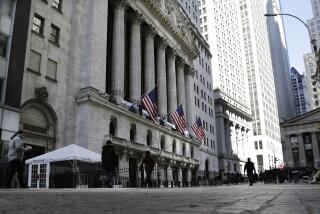Central Bankers Confer Over Market Turmoil
- Share via
BASEL, Switzerland — Central bankers from the United States, Japan, West Germany and eight other major industrial nations held a first round of secretive talks Sunday on prospects for ending the upheaval in world financial markets.
The officials had little to say after emerging from a nearly three-hour working dinner, except to confirm that they would continue their discussions today.
“All I can say is that we had a very good dinner,” said Alan S. Greenspan, chairman of the Federal Reserve Board, the central bank in the United States.
Asked by a reporter if the meeting had included a discussion of interest rates, Greenspan said: “I can’t say.”
Pressed for comment about Japan’s interest-rate policy, Bank of Japan Governor Satoshi Sumita said the central bank would continue to resist a cut in its key discount rate, at least for the time being.
Sumita’s presence was considered a sign of the gravity of the market turmoil, because he usually sends a subordinate to the monthly consultations of central bankers in Basel.
The central bankers, apparently concerned by the fragile state of the financial markets, were unusually careful to avoid making off-hand remarks to reporters.
Robin Leigh-Pemberton, governor of the Bank of England, became visibly angered by reporters’ questions as he returned to his hotel. At one point he snapped: “Look here . . . your presence here is not welcome.”
The meeting, at the headquarters of the Bank for International Settlements, began amid widespread doubts about the ability of the major trading nations to halt the dollar’s recent slide.
Hurt by perceptions among traders that Washington is unable to forge a coherent economic policy, the dollar has lost nearly 7% of its value against the West German mark and 6% against the Japanese yen in two weeks. The plunge ended eight months of relative stability for the U.S. currency.
The two-day meeting is the first such gathering since world financial markets fell into crisis with a record 508-point drop in the Dow Jones industrial average Oct. 19. About a week later, the dollar began its downward spiral.
Foreign-exchange traders had indicated at the close of Friday’s dealings that they were looking to the Basel meeting for possible clues to the future direction of the financial markets.
Jacques Delors, representing the European Economic Community, said Friday that he believed the session would be limited mainly to an exchange of information and views rather than produce major policy initiatives.
A likely topic for discussion is the effect on the markets of last week’s coordinated round of interest-rate cuts by West Germany, Switzerland and the Netherlands, according to Swiss monetary sources, who spoke on condition that they not be identified.
The United States has been pressing the Europeans and Japanese to lower their interest rates as a means of stimulating their economies and giving Washington more room to cut its own rates.
Speculation mounted in U.S. financial markets that the Federal Reserve was moving toward a decision to lower its key discount rate, the interest it charges on short-term loans to commercial banks, from 6%.
The European and Japanese central bankers were expected to reiterate their urgings that Congress and the White House reach an early agreement on substantial cuts in the federal budget deficit. U.S allies have grown increasingly vocal in their view that the key to re-establishing calm on world markets lies in U.S. action on the budget.
More to Read
Inside the business of entertainment
The Wide Shot brings you news, analysis and insights on everything from streaming wars to production — and what it all means for the future.
You may occasionally receive promotional content from the Los Angeles Times.










